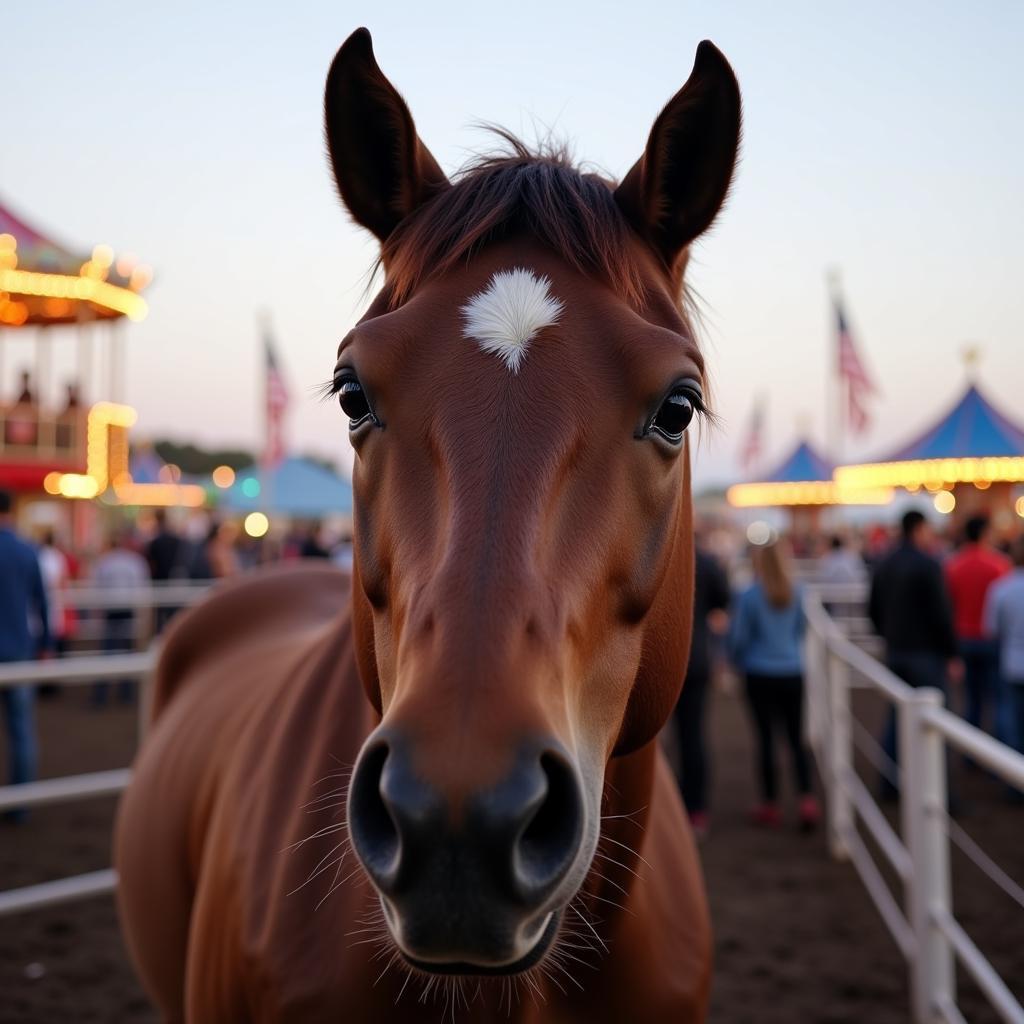The recent news of a Horse Dies At Kentucky State Fair has left many heartbroken and concerned. This incident raises important questions about animal welfare at such events and prompts a deeper look into the potential causes and preventative measures. We’ll explore the circumstances surrounding this tragedy, discuss the potential risks horses face at fairs, and offer insights into how we can better protect these magnificent animals.
The Risks Horses Face at State Fairs
State fairs, while exciting and educational, can present several challenges to a horse’s well-being. The unfamiliar environment, loud noises, large crowds, and changes in routine can be stressful. These stressors can weaken a horse’s immune system, making them more susceptible to illness. Furthermore, the close proximity of numerous animals increases the risk of infectious disease transmission. Transportation to and from the fair also poses risks, including potential injuries during loading, unloading, and travel.
Horses are sensitive creatures, and even seemingly minor changes in their environment can have a significant impact on their health. Changes in feed, water, and stabling arrangements can disrupt their digestive systems, leading to colic, a potentially life-threatening condition.
 Horse at a State Fair
Horse at a State Fair
What Happened at the Kentucky State Fair?
While the specific details surrounding the horse that dies at Kentucky State Fair may vary depending on the case, understanding the potential contributing factors is crucial. Heatstroke, colic, and infectious diseases are among the leading causes of equine fatalities at such events. A thorough investigation is essential to determine the exact cause of death and implement appropriate preventative measures for future fairs.
The emotional toll on owners, handlers, and fairgoers should also be acknowledged. Witnessing such a tragedy can be deeply distressing. It’s important to provide support and resources for those affected.
Preventing Future Tragedies: Best Practices for Equine Care at Fairs
Implementing proactive measures to ensure horse welfare is paramount. Organizers should prioritize creating a safe and comfortable environment for horses. This includes providing adequate ventilation in stables, ensuring access to fresh, clean water, and maintaining a regular feeding schedule with appropriate feed. Veterinary checks should be mandatory upon arrival and throughout the event.
Furthermore, limiting exposure to loud noises and large crowds can minimize stress levels. Designated quiet zones and controlled access to stable areas can help achieve this. Proper hygiene protocols, including regular cleaning and disinfection of stalls and equipment, are crucial for preventing the spread of infectious diseases.
“Proper preparation and attentive care are essential for ensuring the well-being of horses at any event,” says Dr. Emily Carter, DVM, a specialist in equine sports medicine. “Early detection and prompt treatment of any health issues are vital for a positive outcome.”
How to Identify a Horse in Distress
Knowing the signs of a horse in distress can be life-saving. Look for changes in behavior, such as restlessness, pawing the ground, or excessive sweating. Changes in vital signs, such as increased heart rate or respiratory rate, are also warning signs. Any signs of colic, such as rolling, flank watching, or lack of appetite, should be immediately reported to a veterinarian.
“Recognizing the subtle signs of distress can make a significant difference,” adds Dr. David Miller, PhD, an equine behaviorist. “Early intervention is key to preventing a minor issue from escalating into a life-threatening situation.”
Conclusion
The incident of a horse dies at Kentucky State Fair underscores the importance of prioritizing animal welfare at all events. By implementing preventative measures, promoting responsible horse ownership, and educating the public, we can strive to ensure the safety and well-being of these magnificent animals. Let’s work together to make future fairs safer and more enjoyable for both horses and humans.
FAQ
- What are the common causes of horse deaths at fairs?
- How can I tell if a horse is in distress?
- What precautions should fair organizers take to protect horses?
- What are the signs of colic in horses?
- What should I do if I see a horse in distress at a fair?
- Are there any specific regulations regarding horse care at state fairs?
- What resources are available for horse owners participating in fairs?
For other related articles and information, please explore our website further. You can also find more resources on equine health and safety by searching for “equine first aid,” “horse health care,” and “horse show safety tips.”
When you need assistance, please contact us: Phone: 0772127271, Email: [email protected] Or visit us at: QGM2+WX2, Vị Trung, Vị Thuỷ, Hậu Giang, Việt Nam. We have a 24/7 customer service team.